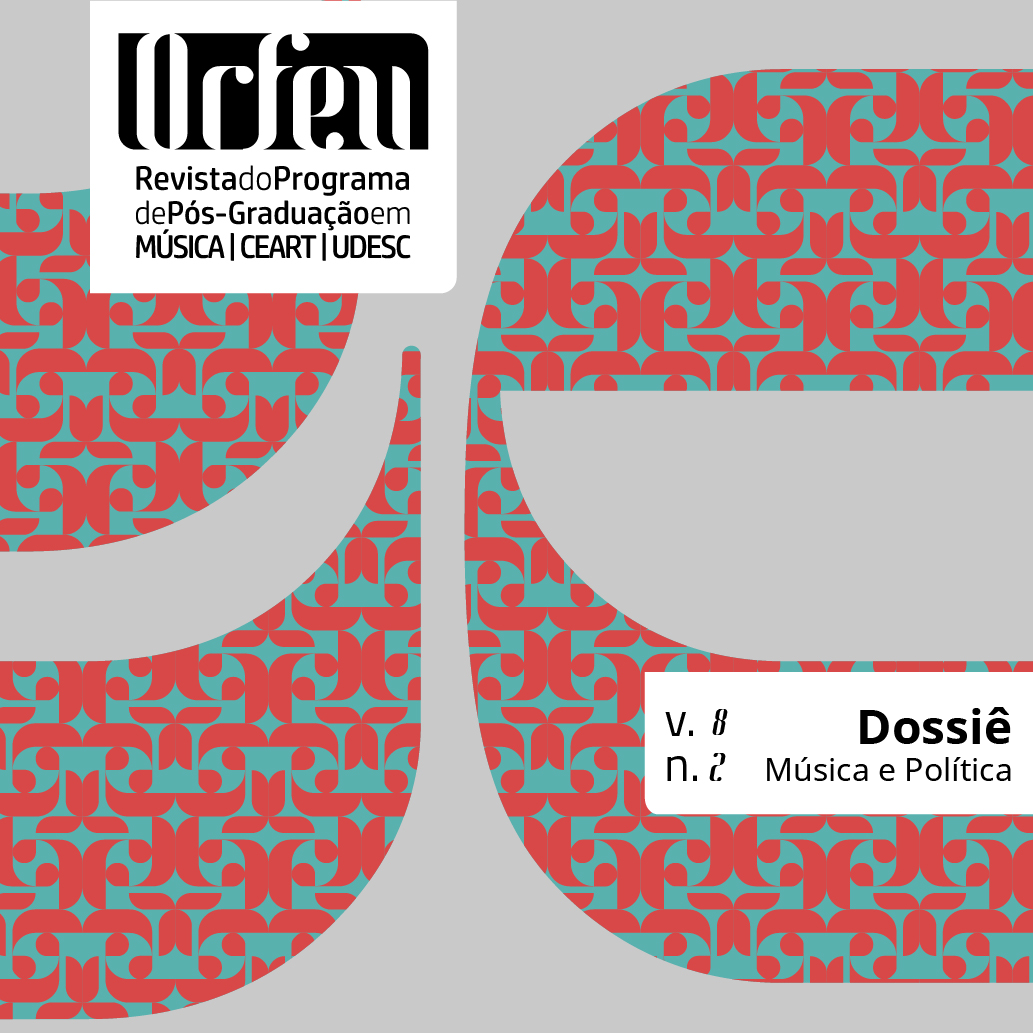Tarsila’s mother:Rediscovering the Piano Works of Lydia do Amaral
DOI:
https://doi.org/10.5965/2525530408022023e0106Keywords:
Lydia do Amaral, Amaralpiano, compositions, unknown composers, women composersAbstract
This article describes the discovery of a collection of piano manuscripts by composer Lydia do Amaral (1855?-1948), which remained in almost total oblivion until 2017, when they were found by family members inside a trunk at one of the family's farms, close to Capivari (SP). To better understand the value of her works, the article has the following objectives: (1) to conduct a brief biographical survey of the composer, based on interviews with her family members and on a few bibliographical sources that mention her; (2) to situate her pieces within their historical context, also considering the situation and the limits imposed by society on a woman composer in Brazil at that time; (3) to present analyses and descriptions of excerpts from three representative works from the collection. As a result, the article demonstrates the high compositional quality and artistic refinement of Lydia do Amaral’s oeuvre, encouraging other pianists and researchers to explore this collection.
Downloads
References
BARROS, Frederico. César Guerra-Peixe e Heitor Villa-Lobos: vanguarda, nacionalismo e nacionalismo de vanguarda. In: Anais do XIV Encontro Regional da ANPUH-RIO. Rio de Janeiro, p. 1-11, 2010.
CAPLIN, William. “Topics and Formal Function: The Case of the Lament”. In: MIRKA, Danuta (ed.), The Oxford Handbook of Topic Theory. Oxford: Oxford University Press, 2014, p. 415-452.
CESETTI, Durval. The narrative of a composer’s biography: some aspects of Szymanowski reception. The Musical Times, v. 150, p. 42-50, Autumn 2009.
CESETTI, Durval. Entrevista de Maria Clara Estanislau do Amaral. Natal, 20 dez. 2022. Entrevista.
CESETTI, Durval. Entrevista de Tarsila (Tarsilinha) do Amaral. Natal, 22 dez. 2022. Entre-vista.
CITRON, Marcia J. “Women and the Lied, 1775-1850”. In BOWERS, Jane; TICK, Judith (ed.), Women making music. Urbana and Chicago: University of Illinois Press, 1986, p. 224-248.
CREPALDE, Neylson J. Villa-Lobos: uma manifestação cultural nacional. Musica Hodie, v. 12, n. 1, p. 232-41, 2012.
FREIRE, Vanda Lima Bellard; PORTELLA, Angela Celis H. Mulheres pianistas e composi-toras, em salões e teatros do Rio de Janeiro (1870-1930). Cuadernos de Música, Artes Visua-les y Artes Escênicas, v. 5, n. 2, p. 61-78, 2010.
KERMAN, Joseph. How we got into analysis, and how to get out. Critical Inquiry, v. 7, n. 2, p. 311-331, 1980.
MOITEIRO, Rita de Cássia. Compositoras brasileiras e o processo de criação musical: uma análise aplicada à musicologia de gênero. Dissertação (Mestrado em Música) - USP, Ribei-rão Preto, 2015.
MOTA, Gisele Pires. Compositoras no Acervo Hermelindo Castello Branco: resgate e divul-gação da biografia e produção cancional de Letícia de Figueiredo e Nênia de Carvalho Fer-nandes. In: Anais do I Simpósio Internacional Música e Crítica. Pelotas (RS), p. 125-32, 2017.
RICE, John A. The morte: a galant voice-leading schema as emblem of lament and composi-tional building-block. Eighteenth-Century Music, v. 12, n. 2, p. 157-181, 2015.
SANTOS, Sônia Duarte. Um diálogo cultural: Tarsila do Amaral. Dissertação (Mestrado em Letras) - Universidade Presbiteriana Mackenzie, São Paulo, 2012.
SILVA, Lucas Eduardo da. Nacionalismo, neofolclorismo e neoclassicismo em Villa-Lobos: uma estética dos conceitos. Dissertação (Mestrado em Artes) ,- USP, São Paulo, 2011.
SILVA, Dalmo Souza e. Tarsila do Amaral: ensaio sobre “brasilidade”. Extraprensa, ano IX, n. 16, p. 55-60, 2015.
SOUZA LIMA, João de. Moto perpétuo - autobiografia do maestro Souza Lima. São Paulo: Ibrasa, 1982.
VIANA, Janaína Pereira; ARAGÃO, Daniela Pedreira. Abre alas: subversão e inovação em Chiquinha Gonzaga. Monografia (Especialização em Literatura, Estudos Culturais e Outras Linguagens) - Universidade Estadual do Piauí, Teresina, 2015.
VOLPE, Maria Alice. Compositores românticos brasileiros: estudos na Europa. Revista Bra-sileira de Música, v. 21, p. 51-76, 1994-95.
WHITE, Hayden. “The historical text as literary artifact”. In: ROBERTS, Geoffrey (editor), The history and narrative reader. London & New York: Routledge, 2001, p. 221-36.
WHITESELL, Lloyd. Men with a past: music and the “anxiety of influence”. 19th-Century Music, v. 18, n. 2, p. 152-67, 1994.
ZHUO, Melody. The reception of Cécile Chaminade’s music and the idea of the woman composer. Senior Honor Thesis (Bachelor of Music) - University of North Carolina at Chapel Hill, Chapel Hill, 2021.
Downloads
Published
How to Cite
Issue
Section
License
Copyright (c) 2023 Durval Cesetti; Nan Qi

This work is licensed under a Creative Commons Attribution 4.0 International License.
Authors who submit their manuscripts to be published in this journal agree to the following terms:
1. Authors retain the copyright and grant to the journal the right of first publication, whilst simultaneously permitting their work to be licensed under the Creative Commons License Attribution, which allows the sharing of work with recognition of the authorship and initial publication in this journal.
2. Contributions in this journal are open access; this means they are based in free use, and non-commercial applications.






